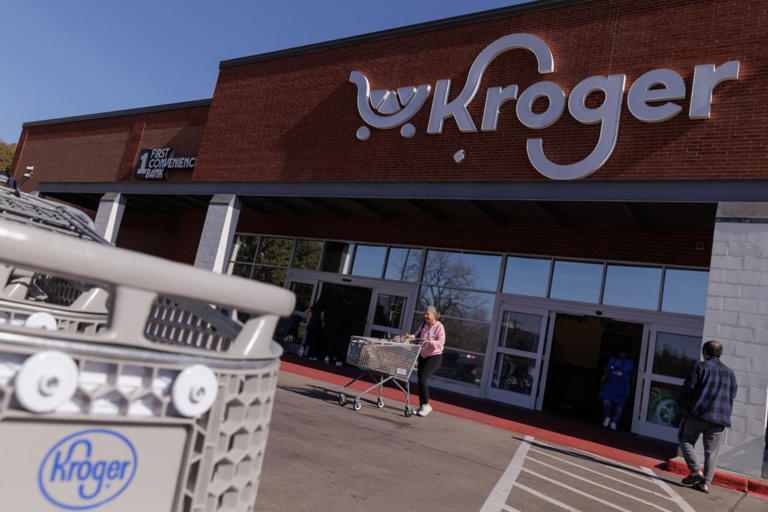Kroger’s upcoming earnings report, scheduled for Thursday, is eagerly awaited as the grocery giant seeks to solidify its position in the fiercely competitive market dominated by the likes of Walmart and Costco Wholesale.
Analysts anticipate a robust performance for the fourth quarter, with sales expected to increase by 6.4% to $37 billion compared to the same period last year. Earnings are forecasted to rise to $1.13 per share, reflecting a 14% increase year-over-year. Despite these positive expectations, Kroger has faced challenges in recent quarters, with sales lagging behind the previous year, even as grocery prices have surged.
The grocery industry is undergoing significant shifts, with consumers tightening their spending amid inflation. At the same time, large retailers like Walmart and Costco are leveraging their scale to offer competitive pricing, posing a formidable challenge to traditional grocers. Additionally, e-commerce players such as Amazon have disrupted the industry, emphasizing the importance of store pickup and home delivery for grocers to remain relevant.
In response to these challenges, Kroger announced plans in 2022 to acquire rival Albertsons for $25 billion. The proposed merger aims to enhance Kroger’s competitiveness, enabling it to offer lower prices and higher wages to employees. If successful, the merger would create a substantially larger company with nearly 5,000 stores and over 700,000 employees, although still smaller than Walmart in scale.
With its extensive network of over 2,700 stores across various banners, including Ralphs and Food 4 Less, Kroger is strategically positioned to navigate the evolving landscape of the grocery industry. However, the outcome of its earnings report and the potential merger with Albertsons will provide valuable insights into Kroger’s future trajectory and its ability to remain a dominant player in the market.
The proposed merger between Kroger and Albertsons faced a significant setback when the Federal Trade Commission (FTC) filed a lawsuit to block the merger, citing concerns about reduced competition and potential negative impacts on consumers, product offerings, and worker wages.
The FTC identified 85 local markets across 17 states where Kroger and Albertsons hold dominant positions in the grocery industry, raising concerns about the risk of monopolistic control. States such as California, Washington, Colorado, and Oregon have the highest number of markets on the list.
While traditional supermarkets face competition from various retailers selling grocery items, the FTC argues that even considering these alternative retailers, the merger could still lead to anticompetitive outcomes in most of the identified markets. The agency contends that consumers may not have sufficient options to shift their purchases away from Kroger-Albertsons if prices are increased or product quality is diminished, as other retailers offer significantly different customer experiences. For example, club stores like Costco and Sam’s Club require membership fees and offer bulk packaging, while discount grocers like Aldi and Lidl focus on private labels and offer limited services compared to traditional supermarkets.
Kroger has stated its readiness to contest the FTC’s legal action in court. Despite the uncertainty surrounding the merger, Kroger’s stock has maintained a relatively stable trading range since the announcement of the proposed merger, trading 8.5% higher than a year ago. Shares experienced a 1.9% increase in Wednesday trading ahead of the earnings report, reflecting investor optimism despite the regulatory challenges facing the company.
